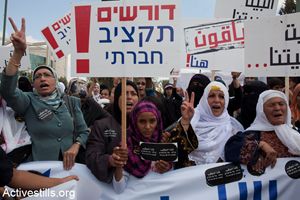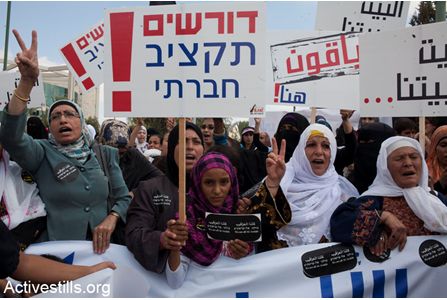
Israel’s government on Sunday approved the recommendations of Minister without portfolio Benny Begin to “change the program regulating Bedouin settlements in the Negev”. The reform is aimed at solving definitively the issue of Bedouin ownership claims on Negev lands and according to Hadash it’s a “provocative and racist anti-Bedouin program – the Prawer Plan”
September 2011 the government approved the Prawer Plan for mass expulsion of the Arab Bedouin community in the Negev (Naqab) desert. If fully implemented this plan will result in the forced displacement of up to 70,000 Arab Bedouin citizens of Israel and the destruction of 35 “unrecognized” villages. Despite the Arab Bedouin community’s complete rejection of the plan and strong disapproval from the international community and human rights groups, the Prawer Plan is happening now.
More than 1,200 homes were demolished in 2011 and in 2012 a special police force is slated to officially begin implementing the plan, and demolish even more. According to Adalah activsist: “We and NGO’s partners have been challenging the Prawer Plan before courts, government authorities and the international community, but we need your help to stop what would be the largest single act of forced displacement of Arab citizens of Israel since the 1950s!”
What is the Prawer Plan?
Arab Bedouin citizens of Israel, inhabitants of the Naqab (Negev) desert since the seventh century, are the most vulnerable community in Israel. For over 60 years, the indigenous Arab Bedouin have faced a state policy of displacement, home demolitions and dispossession of their ancestral land. Today, 70,000 Arab Bedouin citizens live in 35 villages that either predate the establishment of the State in 1948, or were created by Israeli military order in the early 1950s. The State of Israel considers the villages “unrecognized” and the inhabitants “trespassers on State land,” so it denies the citizens access to state infrastructure like water, electricity, sewage, education, health care and roads. The state deliberately withholds basic services from these villages to “encourage” the Arab Bedouin citizens to give up their ancestral land.
In September 2011, the Israeli government approved the Prawer Plan, the brainchild of former Deputy Chair of the National Security Council, Mr. Ehud Prawer. If implemented, the Prawer Plan will result in the destruction of the unrecognized villages and the forced displacement of up to 70,000 Arab Bedouin citizens. This plan was completed without consultation of the local community, and is a gross violation of the constitutional rights of the Arab Bedouin citizens to property, dignity, equality, adequate housing, and freedom to choose their own residence.
Hadash calls during the recent elections campaign to cancel the Prawer Plan, recognize the “unrecognized villages” and the land claims of the Arab Bedouin communities; alt home demolitions and forced evictions, engage in meaningful dialogue with the Arab Bedouin community and the Arab political leadership to justly resolve the land claims and to invest in greater health, education, and employment opportunities for Arab Bedouin citizens of Israel
The Arab Bedouin minority of the Negev is one of the most discriminated groups within the Arab population and within Israeli society as a whole. More than half of the approximately 160,000 Negev Bedouins reside in unrecognized villages, which the state refuses to provide with a planning structure and place under municipal jurisdiction. The government uses a variety of measures to pressure Bedouins into relocating to government-planned urban centers that disregard their lifestyle and needs. Whole communities have been issued demolition orders; others are forced to continue living in unrecognized villages that are denied basic services and infrastructure, such as electricity and running water.



